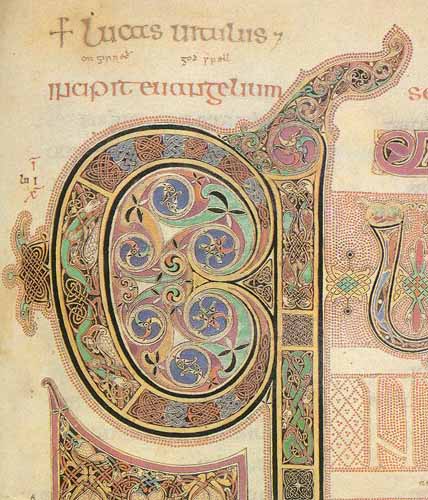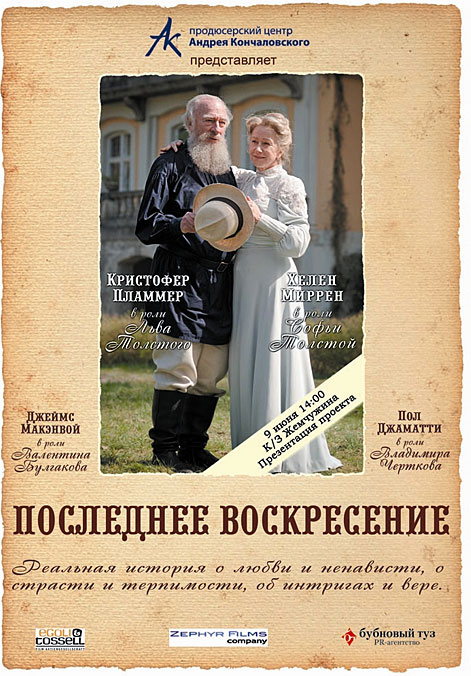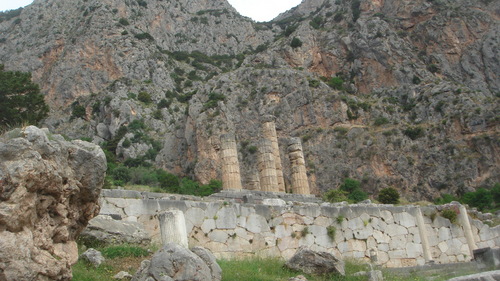
Without question, the oracle at Delphi was the most famous prophet or prophetess in all the Greco-Roman world. Most ancient’s views on prophecy were shaped by what went on at prophetic sites like this one seen above (the Temple of Apollo where the pythia sat on her three legged stool and prophecied). Delphi had become not only one of the more important religious sites in all the world, but also a place where there were many treasuries and temples of all sorts where people stored valuables, worked out manumission processes for slaves, and the like. On top of all that, and on top of this site was the stadium where the Delphian games were held. It seems clear to me that some of the problems Paul had with Gentiles in Corinth when it came to prophecy were caused by the way the Corinthians thought about prophecy, based on their religious heritage.
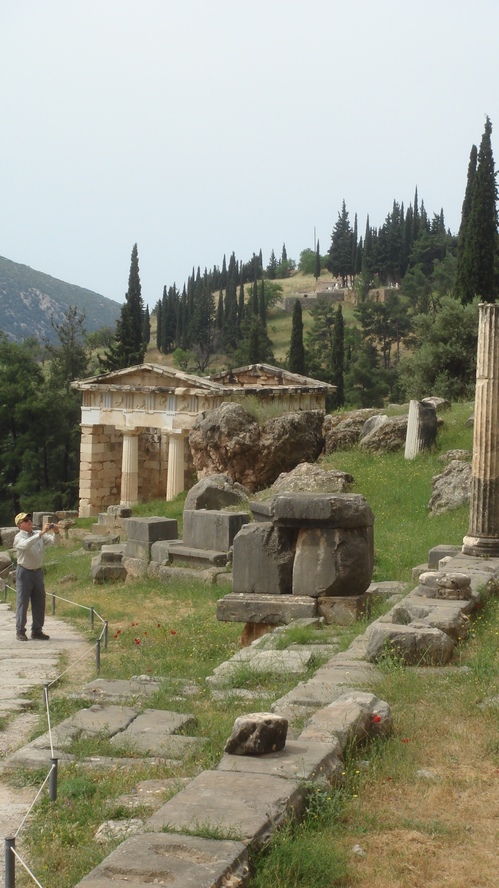
Two aspects of oracular prophecy at Delphi come into play. Firstly, the pythia did not utter intelligible words it would appear. Rather the priests, called ‘prophetes’ interpreted her ecstactic utterances to the inquirer. Secondly, the pythia was seen as a consulting guide whom one would ask questions of, often yes or no questions. Thirdly, the normal way to come into the presence of the divine in antiquity, especially if one was making an offering or entreating a god was to cover one’s head. These factors come into play in 1 Cor. 11 and 14. Paul in 1 Cor. 11 is trying to distinguish Christian practice in regard to head-coverings from either the Jewish practice or the Greco-Roman practice. In the latter everyone covered their heads in the divine presence. In the former, Jewish men did so. Paul inaugurates a more specifically Christian practice by having only Christian women to do so— based on the theological rationale that only God’s glory should appear in Christian worship, and since women’s hair was ‘her’ glory (and often a distraction to men in worship— see 1 Tim .2 critiquing women who plait their hair with jewels and wear it uncovered in worship. Picture that scenario in a small Christian evening meeting full of lit lamps. The woman becomes a lit up disco-ball in the lamplight) that needed to be covered.
Secondly, it is no surprise that the Corinthians were confused about the differences between ecstatic utterance and prophecy. At Delphi, ecstatic utterance was the prophecy, and the ‘prophetes’ only interpreted it in intelligible words. Hence, Paul needed to clarify the difference when it came to Christian prophecy. Ecstatic utterance or glossolalia did indeed need an interpreter if it happened in a public worship setting, but tongues was not prophecy— rather it was an angelic prayer language directed towards God.
Thirdly, we have the problem of some women in Corinth asking questions during the time of the prophecies and explanations in Christian worship. In there minds this must have seemed appropriate since ‘ask the oracle’ was the nature of things in Greek prophetic settings. Paul tells these women if they have questions, let them ask at home. Don’t turn Christian worship into Q+A. Thus again he is distinguishing Christian from Greco-Roman practice. And there is one more thing.
The oracle at Delphi, and elsewhere offered enigmatic responses, more like riddles. Thus when a King like Agamemnon would come to the oracle and ask a question— namely should I go to war against the Persians, the response was— ‘if you go to war against the Persians, a great victory will be won’. Notice she does not say by whom. Paul viewed prophecy as revelation not riddle, something that spoke directly to the hearts of his people and their particular situations. It does appear that Paul knew that Christian prophecy was not simply like OT prophecy, as he warns in Rom. 12 about not prophesying beyond the measure of one’s faith. The danger was an utterance that was part inspiration and part perspiration, and utterance which he says needed to be critically sifted by wise believers in the audience. This is difference from the ‘thus sayeth the Lord’ quality of OT prophecy which didn’t require critical sifting, simply acceptance and application. The NT era was after all the era of the fulfillment of prophecies of OT, not the time for generating tons of new prophecy, although that happened some. Note how we have only one book of prophecy in the NT— the last one. NT literature is not like the former and latter prophets of the OT canon.
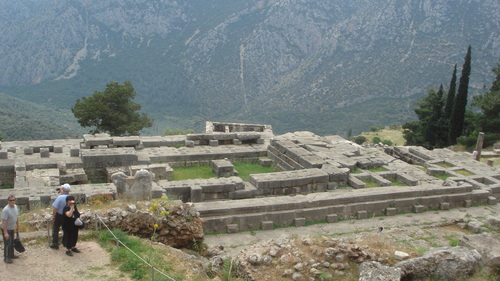
The temple of Apollo seen from above. The pythia would have sat in the equivalent of the holy of holies at the back (far right) in this temple.
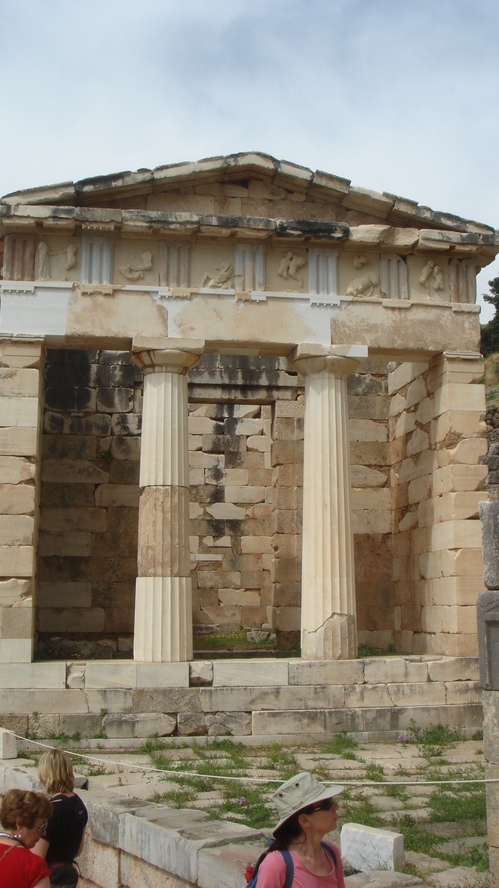
One of the many treasuries at Delphi.
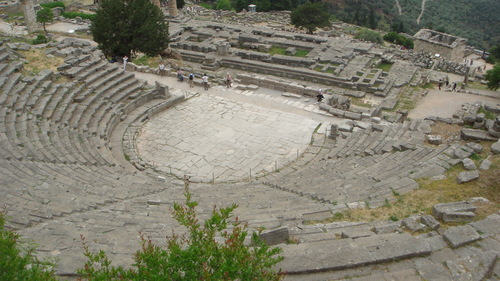
Here is the theater which stands above the temple of Apollo. There were of course also plays, comedies and tragedies, here as well.
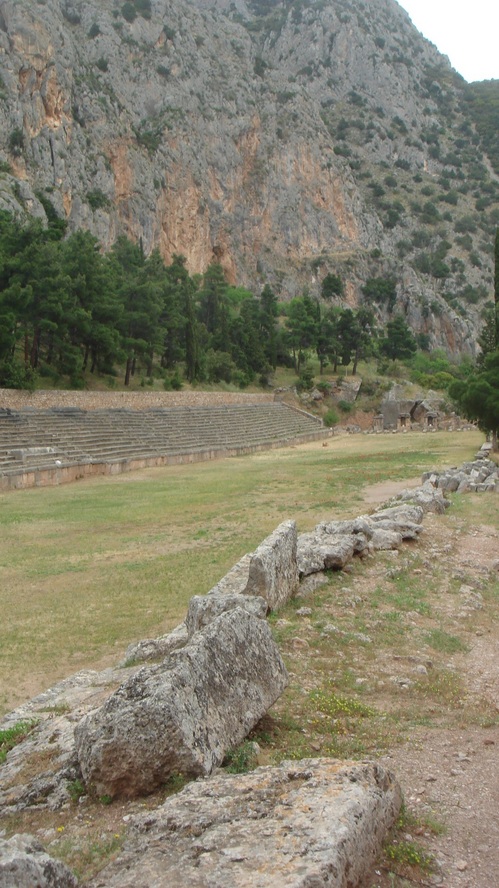
The stadium high above both the treasuries, the temples and the theater. As you can see this was a cultural complex meant to minister to a variety of the needs and wants of people. When Paul went to Corinth, the temple of Apollo stood as a long enduring landmark, the one thing that the Romans didn’t destroy when they sacked the town in the second century B.C. It, and what it represented, was one of the things Paul most urgently needed to provide an alternative to, so Christians would stop going to pagan temples for help, healing, advice, and prophecy, as well as for fellowship and worship and meeting with friends over a meal.






